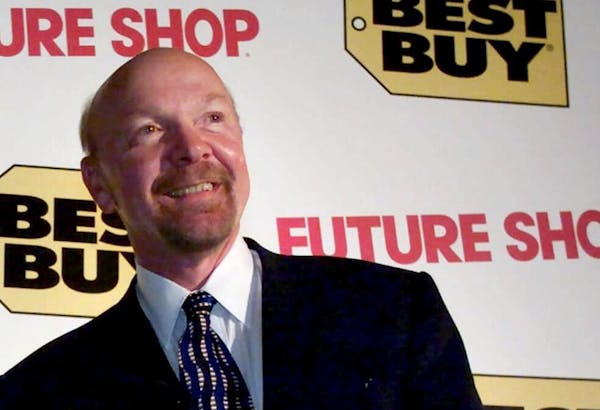Show up smiling at company functions. Give advice when the CEO asks for it. Mentor young executives. Those are the typical duties of a chairman emeritus.
But Richard Schulze likely won't be a normal chairman emeritus at Best Buy. That sort of limited, honorary position hardly squares with the personal history of the strong-willed executive who built a retail giant from scratch. The role is historically not well-defined, and Best Buy's challenge is to find a way for its forceful founder, who owns a huge share of the company, to make constructive contributions without creating problems for the people who are actually in charge.
"When the chairman emeritus starts looking over the shoulder of the chairman, things get really sticky," said Richard Painter, a law professor at the University of Minnesota. "You've really got to have one captain of the ship, particularly when you're going through turbulent waters."
Best Buy, which announced Monday that Schulze is returning to the company in this new role, is striking a balance between welcoming him back and setting clear boundaries, while Schulze says he is eager to engage directly with Best Buy employees.
"I can be more helpful to management if I could range more [freely] across our employment force," Schulze told the Star Tribune. "That's the best role for me at this time."
CEO Hubert Joly and the board of Best Buy, whose chairman is Hatim Tyabji, have taken steps to define that role. Schulze will help with training, and be available to attend or speak at company functions and shareholder meetings. But in a detailed letter filed with the Securities and Exchange Commission, Joly said Schulze must let him know in advance when he plans to visit corporate headquarters.
At the CEO's request, Schulze may mentor one or two "high-potential officers" of the company. He will meet regularly with Joly, receive monthly financial reports, and Joly will "make himself reasonably available upon your request," Joly wrote. Yet company officials said Monday that Schulze will not attend board meetings, nor will he have free rein to talk to employees and executives.
Schulze has spent the past several months trying to buy the company, following his ouster as board chairman last summer. When his takeover bid failed, Best Buy and Schulze eventually agreed on a way for him to rejoin the company.
Precedent for the position of chairman emeritus varies widely, said Joseph Grundfest, a law professor at Stanford University, and whether it works depends on the specifics of the situation.
"It's a little bit like having a pope emeritus," Grundfest said. "It's not done very often, and it's hard to generalize about the practice."
Those who know Schulze say that even in an advisory role, he will aggressively engage about all areas of the company. He built Best Buy from a single store to a retail powerhouse. He won't stand quietly on the sidelines now.
"I wouldn't be surprised if Dick stuck his nose into everybody's business," a source close to Schulze said.
The founder's role will be colored by the fact that he retains about a 20 percent ownership stake in the Richfield-based retailer. He is not only a charismatic and emotionally invested founder and former CEO, he's the company's largest stockholder.
"It's different than a chairman or CEO who sticks around who doesn't have that ownership stake," said David Becher, a finance professor at Drexel University who specializes in corporate governance. "There will be more issues there, because he has more vested interest in the performance of the firm."
Still, it's difficult to interpret Schulze's appointment as anything but a good sign for Best Buy, Becher said.
"In this case, because it was such a bad situation, having him placated, having him kind of bless the new CEO should be a positive sign," he said. "If you believe that he has good intentions for the firm, having him back in the fold is a positive."
Star Tribune staff writer Thomas Lee contributed to this report. Adam Belz • 612-673-4405 Twitter: @adambelz
